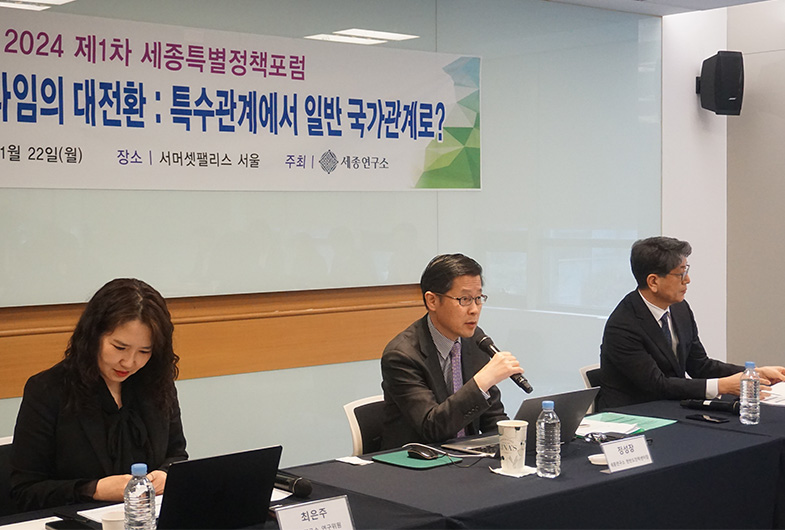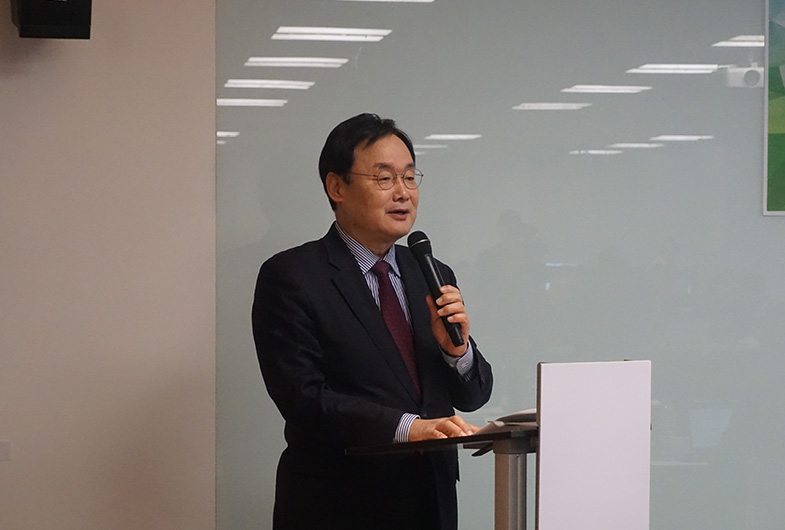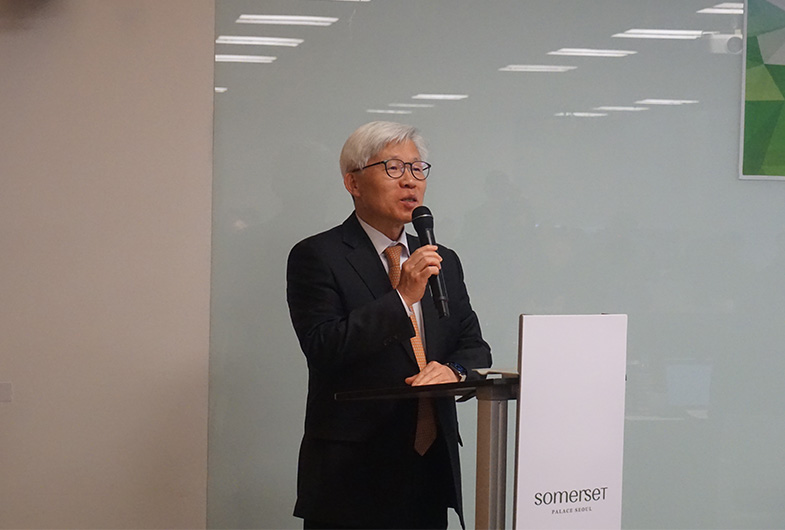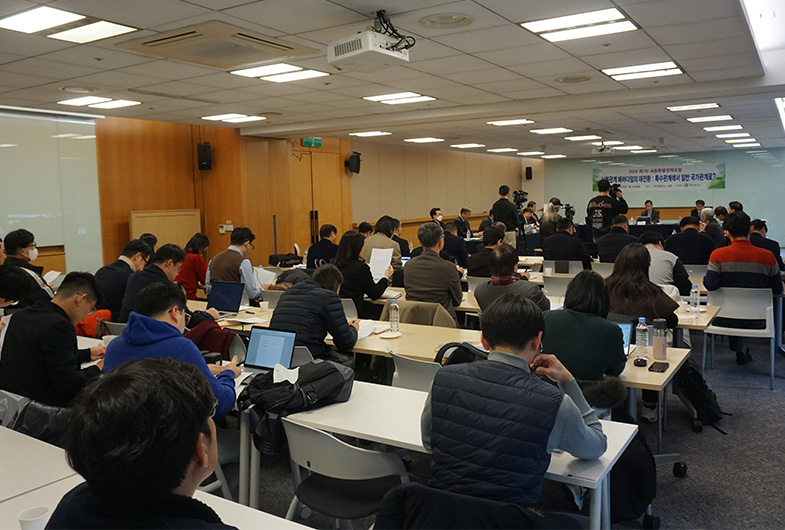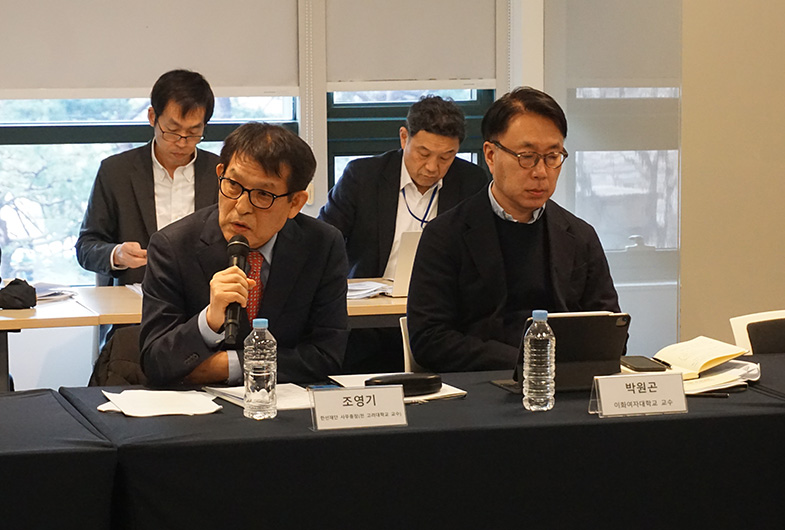On January 23, 2024, the Sejong Institute held a special policy forum on "A Paradigm Shift in Inter-Korean Relations: From Special Relations to General State Relations?" at Somerset Palace Seoul.
The forum was moderated by Seong-Chang Cheong, Director of the Center for Korean Peninsula Strategy, after welcoming remarks by Yongjoon Lee, Chairman of the Sejong Institute, and opening remarks by Sang Hyun Lee, President of the Sejong Institute.
The forum examined the background of Kim Jong-un's denial of "kinship" and insistence on "two-state relations" at the 9th Plenum of the 8th Party Central Committee of the DPRK late last year, the necessity and considerations for the transformation of inter-Korean relations, and the implications of the East-West German experience of cooperation and reunification for South Korea, as well as the domestic and international challenges of the transition from inter-Korean relations to normal state relations.
In the first session, "North Korea's 'Two Korea' Policy and the Future of Inter-Korean Relations," Eunju Choi(Sejong Institute) first assessed the core content of North Korea's recent denial of 'kinship' and insistence on 'two-state relations' based on official statements by the Workers' Party of Korea.
Furthermore, she raised the need to "rethink the existing regulations on inter-Korean economic cooperation projects and exchange activities, which have been conducted under the premise of a 'provisional special relationship aimed at reunification' (the Inter-Korean Basic Agreement)." He also pointed out that "North Korea's military threat should not be underestimated, but rather than focusing solely on the military aspect, it is urgent to focus on crisis management in the short term and explore responses in the diplomatic and security sectors in the medium and long term to North Korea's strategic changes represented by the two-state theory."
Dr. Eunmin Kwon(North Korean Studies, Lawyer) discussed the past, present, and future of the Korean Peninsula in the context of the need to transform inter-Korean relations by examining the framework of mutual recognition in the constitutions and laws of the two Koreas, as well as in major agreements and precedents.
After looking back at the past of inter-Korean relations, when the political logic and ideological imperatives of the Cold War took precedence, he diagnosed the current inter-Korean relations represented by the Inter-Korean Exchange and Cooperation Act, the Inter-Korean Relations Development Act, the Inter-Korean Basic Agreement, and the Panmunjom Declaration, and pointed out the inherent limitations of the existing peaceful coexistence-type reunification plan, which was carried out within the framework of 'ethnic special relations,' and the gaps in the institutional arrangements that could rationally resolve disputes between the two Koreas.
In the second session, "The East-West German Experience and Korea's Challenges," Professor Inho Song(Handong University School of Law, Lawyer) spoke on the topic of "Implications of the East-West Relationship".
By comparing the constitutional differences between the unification provisions of West Germany and South Korea, he examined the aspects of the constitutional order that, in principle, can be accepted by South Korea based on the German unification case, and those that need to be critically reviewed in light of the different situations on the Korean Peninsula.
After concluding that "North Korea's recent attitude toward treating inter-Korean relations as a relationship between states is very similar to East Germany's stance to free itself from West German manpower during the division of the country," Professor Song pointed out that the current unification plan, the National Community Unification Plan, does not fully capture the spirit of 'peaceful unification based on a liberal democratic basic order' in Article 4 of the Constitution, and proposed a 'Korean Peninsula Value Community Unification Plan' that presupposes and aims for the dignity and value of all human beings."
On the topic of "Domestic and International Challenges of the Transformation of Inter-Korean Relations," Dr. Young-ho Park (Korea Institute for National Unification) examined the changes in North Korea's policy toward the South and the changing perceptions of unification among South Koreans in terms of new unification governance, and emphasized the need for a revised unification framework that reflects generational, demographic, and cultural changes in Korean society.
Dr. Park suggests "establishing a permanent body such as the National Assembly's Special Committee on Unification Policy to serve as a convergence point for political and public opinion, and establishing and operating a civilian-led, non-partisan pan-reunification policy consultation body (tentatively titled the '2045 Committee')." In particular, it emphasizes the need to "redefine the perception of unification in line with changes in domestic and international conditions in light of the civilizational and historical transition of the global community that the next generation will face, and to develop and disseminate unification discourse and civic education that incorporates this global civic orientation as a future task."
